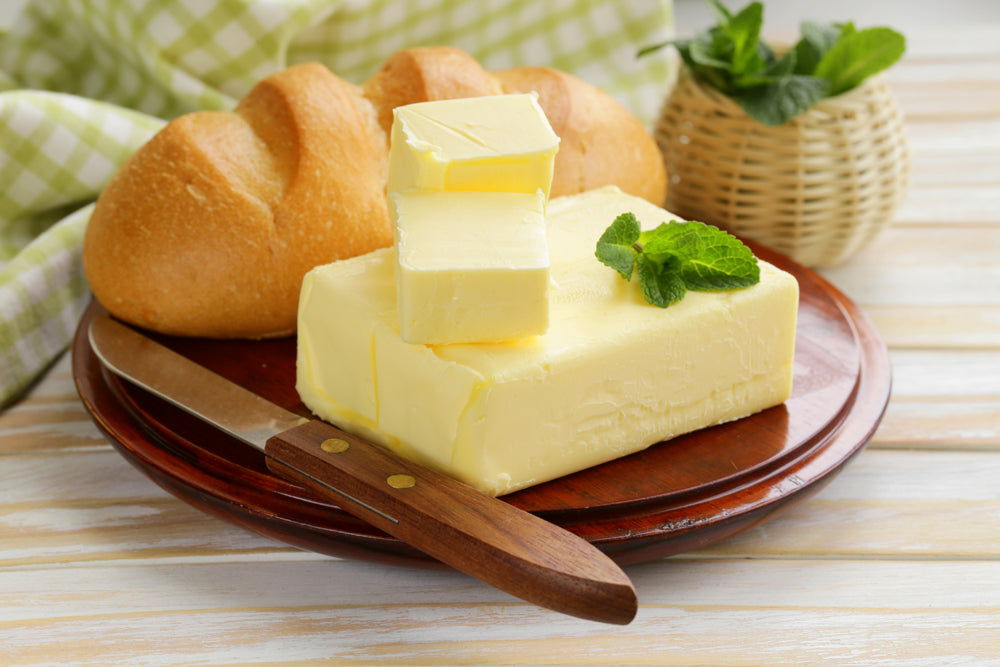We have all heard the controversy before: that butter is bad for you. Many medical professionals have told patients to cut back or avoid it all together, especially if they have heart or cholesterol problems. What if I told you that butter is NOT created equally? In reasonable amounts butter may actually improve your health in a variety of ways!
What Is Butter?
Butter is created by churning fresh or fermented cream which separates the buttermilk from the butter fat. Most often it is sourced from cows but can come from other mammals such as sheep, goats, and buffalo. When finished, it contains fat soluble vitamins, an array of fatty acids, and around 80 percent fat. The color can range from white to a rich yellow. Can you guess what color is healthiest? You guessed it, its the deep yellow form, which results from cows being fed grass! Now why is this? This is because when cows consume a diet primarily of grass, they get a lot of beta carotene (a form of vitamin A), which ends up expressing itself in the cream used to make butter.
What Is Ghee And How Does It Compare To Butter?
Ghee, or clarified butter, is akin to butter in that it contains a similar nutrition profile but the lactose and casein has been removed. Like butter, it is still rich in medium and short chain fatty acids and butyrate (think anti-inflammatory). This is great for those who have dairy allergies. If you have been avoiding dairy and butter due to allergies, I would encourage you to experiment with grass fed ghee and see how your body reacts.
Both ghee and butter contain medium and short chain fatty acids; Ghee around 25 percent and butter around 15 percent. These fatty acids are metabolized differently in our bodies than long chain fatty acids and are not associated with cardiovascular disease. YEAH!

Ghee has a higher smoking point than butter so is better utilized when cooking at higher temperatures. The opposite can be said for butter, which is best used at lower temperatures when cooking. Ghee’s smoke point is around 485°F (250°C) and butter 350°F (175°F).
Grass Vs. Grain Fed Butter
So what about grass vs grain fed cows when it comes to butter? Studies have shown that milk from grass fed cows is significantly higher in soluble vitamins and fatty acids, such as immune boosting and disease fighting conjugated linoleic acid (CLA). (1, 2) This means there is a notably higher nutrient profile from grass fed cows when it comes to their milk, butter, and meat.
Health Benefits Of Butter
Anti-inflammatory
Butter contains a high level of butyric acid which science has shown decreased inflammation. Inflammation is the root cause of most diseases, so consuming more butyric acid from grass fed butter can be beneficial.
Excellent source of vitamin A
Vitamin A is fat soluble and used in a wide array of our bodily functions. Compared to grain fed cows, grass fed cows can have up to 3 percent more vitamin A per tablespoon. Over a period of time, this small difference can add up.
Energy booster
The medium chain triglycerides (MTCs) found in butter are great at being converted directly into fuel in our bodies. This is excellent for not only supporting your immune system, but also boosting your metabolism.
Increased immunity and infant development
Butter contains Arachidonic Acid (ARA) which plays a role in molecule signaling, immunity, and “there is strong evidence based on animal and human studies that ARA is critical for infant growth, brain development, and health.” (3)
Contains cancer fighting CLA
Grass fed cows contain significantly more CLA (in some cases 500% more CLA than typical dairy cow diets (4)). CLA has been found to potentially protect against a variety of cancers.

By all means, avoid proceeded fake margarine which has been found to increase the risk of coronary heart disease. (5) With all this said, the best butter is organic and comes from grass fed cows. Look for butter made from raw or fermented milk. Aim for unsalted or if it contains salt, look to see that they use sea salt. Grass fed butter is not to be feared. It is anti-inflammatory, heart healthy, energy boosting, and full of nutrients.








